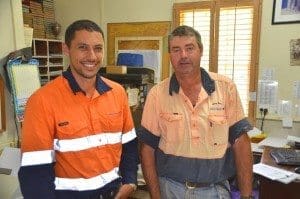WORKPLACE injury rates among staff at the Raby Merino Stud, near Warren in New South Wales, have fallen to close to zero thanks to a new attitude to safety.
The low injury rate is due to a recognition that the old view that ‘it won’t happen to me’ is simply not good enough, to ensure everyone gets home safely to their families each night.
Key to this shift has been a blame-free workplace where staff feel more than comfortable to talk about safety, regular ‘tool box’ meetings involving staff and management, systems to ensure regular checking of workplaces and machinery, safety signage and inductions for new staff and contractors.
According to research conducted by the Primary Industries Health & Safety Partnership (PIHSP), almost 50,000 weeks of work in agriculture and fisheries were lost annually due to injury between 2008 and 2012.

Farm manager Ashley Bell and assistant manager health safety & environment, Shea O’Neill, in the office at Raby
Ashley Bell is the farm manager at Raby, one of Hassad Australia’s 14 grazing aggregations across Australia. Hassad has provided strong leadership to drive a shift in safety culture across all its operations.
“At Raby we have a set of policies to work by, to keep the place safe. In many cases, our changes haven’t been time-consuming or costly, and could be implemented in any farming or grazing operation,” Mr Bell said.
“It’s not that hard to change the way you think about safety. You just get in a routine of checking everything before you use it, and we make sure that when staff come forward to say something is wrong, we fix it so no one gets hurt, and so the place can keep running.”
Amongst many other changes, Raby has swapped four-wheel motorbikes for side-by-sides, buried power lines, installed handrails in shearing sheds and upgraded the shearing plant, upgraded bunding on irrigation, covered ladders on silos and installed signage around the property.
Corporate owned properties are often viewed as having more funds available to invest in safety; however it costs very little for a family farm business to instil a positive culture of safety and prevent easily avoidable injuries, PIHSP suggests.
Hassad is also learning from other industries with assistant manager health safety & environment, Shea O’Neill, joining the company from the oil and gas sector where an emphasis on safety is simply accepted as a part of how business is done.
“The culture of safety in the workplace at Raby, and all Hassad Australia’s aggregations, is driven from senior management all the way down to the most junior farm hand. We have systems in place and the staff are empowered to carry these out on the ground,” Mr O’Neill said.
“This means things like maintaining vehicles and equipment safely, using safety equipment like helmets on motor bikes, providing proper training for staff, and regular audits of safety across the business to keep standards up.
“Our systems have had a profound impact on safety of our workforce, with a decline in serious injuries and the overall incident tally.
“I think that health and safety management as a whole in corporate agriculture is very strong at the moment. Where we really need to focus our energies is getting out those key learnings on how corporates manage health and safety out to some of those smaller farming businesses. Those solutions could be beneficial for them.”
Hassad uses a three-tiered system to instil safety on their properties that can be easily replicated in a family operation:
- Infrastructure – maintaining buildings, structures and the workplace to safe standards.
- Culture – ensuring staff or family have the same attitude that safety matters and feel comfortable talking about safety in the workplace.
- Systems – making sure staff and family members can do their jobs safely. Includes checking equipment and workplaces, the ability to report and fix unsafe equipment, and having adequate training where needed.
To view a short video about Hassad’s approach to WH&S on Raby, click the link below.
The Primary Industries Health & Safety Partnership (PIHSP) aims to drive best practise in WH&S in primary industries. It is funded by the Research and Development Corporations for the meat processing, cotton, grains, fishing and livestock industries as well as the Rural Industries Research and Development Corporation.
Source: PIHSP




HAVE YOUR SAY